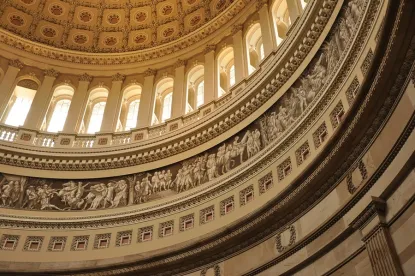Talks among party leaders in Washington about a future COVID-19 relief package are at an impasse, with Democrats still adamant about enacting legislation that injects trillions of additional dollars into the American economy, and Republicans seemingly trying to run out the clock in hopes Democrats will consent to passing a “skinny” deal that temporarily addresses expiring relief programs. One of those programs is the expanded unemployment benefits for jobless workers created on a bipartisan basis through the CARES Act in March as the US economy was put in lockdown. The expanded benefits will expire Friday, the same day the latest national jobs report is released by the US Bureau of Labor Statistics, potentially creating new pressure for lawmakers to act.
Today’s briefing covers: Updates on US issues, including the FY 2021 appropriations process, tax and economic development, health, trade, pandemic response oversight and investigations, and developments at the state level.
Publication Note: Following a modified schedule, the next briefing will be published on Tuesday, August 4.
The conventional wisdom in Washington for months has been that Republicans and Democrats would come together in late July to craft a consensus bill striking a compromise between the US$3.5 trillion HEROES Act approved by the Democratic-controlled House of Representatives in May and the more spartan approach favored by most Republicans. This is the path effectively urged by the nation’s top monetary policy official, Federal Reserve Board Chairman Jerome Powell, who called on Congress to use its powers of taxation and spending “sooner rather than later” to build on CARES with further significant action to prevent “lasting damage” to the US economy. The Department of Commerce released data this morning indicating the American economy contracted by the equivalent of nearly 33 percent between April and June as a result of the pandemic and steps taken to control the spread of the coronavirus.
While the parties have come together physically at the table, neither side is showing signs of moving off its starting position in the discussions. Democratic leaders Nancy Pelosi (D-CA) and Chuck Schumer (D-NY) are seen by their members as having the upper hand in the talks, having unified their party over the past several months in support of the HEROES proposal. This creates a disincentive for the Democratic leaders to make a counterproposal to the Senate Republican HEALS package introduced this week by Senate Majority Leader Mitch McConnell (R-KY) on behalf of the congressional GOP and the White House.
Republicans, for their part, cannot compromise because they are divided amongst themselves. Some Republican Members of Congress are supportive of enacting a middle-ground bill that spends US$1 trillion or more in the name of public health and economic stabilization and “stimulus.” But others have declared their opposition to any significant additional spending. The divisions in the GOP ranks extend all the way to the White House negotiating team itself, which pairs Treasury Secretary Steven Mnuchin – who has successfully negotiated bipartisan deals for President Donald Trump at various key points in his administration – with newly-minted White House chief of staff Mark Meadows, a former House Republican congressman with a history of opposition to bipartisan agreements of the sort necessary for governing.
The Meadows-Mnuchin tandem is a reflection of the conflicted stance taken for months by the White House toward the next coronavirus response package. President Trump at one point urged Congress to build on the CARES Act by enacting an even bigger bill that would include US$2 trillion or more in national infrastructure investments. At other points, he and other administration officials indicated a top priority for the next measure would be payroll tax relief. Mnuchin, with the apparent support of the president, not long ago said the Trump Administration would seek a COVID-19 bill that included additional money for state and local governments, infrastructure, payroll tax provisions, relief for the restaurant, sports and entertainment industries and other emergency programs that would collectively require enactment of a bill far larger than the package Senate Republicans and the White House offered Monday. These broad aspirations failed to get traction in the Senate Republican Conference, resulting in Meadows being dispatched to flank Mnuchin in the bipartisan COVID-19 discussions that are now underway as a means of assuring GOP skeptics that their views would have a voice at the table.
Meadows emerged from discussions Wednesday to declare grimly that talks with Pelosi and Schumer are going nowhere and the CARES Act’s enhanced unemployment benefits are likely to expire. Republicans, including the White House, will likely put forth a last-minute stopgap proposal that would provide some measure of extended support for unemployed workers. But unless the stopgap proposal is robust enough to be accepted by Democrats and simultaneously backed by a unified GOP, it will fail. Talks among Congress and the White House appear destined to drag on into August, with little hope for speedy resolution and a chance of ultimately yielding no agreement at all.
Appropriations Updates
The House today begins consideration of H.R. 7617, the second – and likely final – package of House appropriations bills providing funding and shaping public policy for fiscal year 2021, which begins on October 1. The US$1.31 trillion proposal is comprised of six individual funding measures – Defense; Commerce, Justice, Science; Energy and Water Development; Financial Services and General Government; Labor, Health and Human Services, Education; and Transportation, Housing, and Urban Development. Full House approval of the legislation is expected on Friday.
The impact of COVID-19, which has affected lawmakers in both the House and Senate, is now being directly felt by the House Appropriations Committee. The Committee’s ranking member, Representative Kay Granger (R-TX), who was slated to manage GOP floor time during today’s general debate, announced yesterday that “at the direction of the Attending Physician (of the House of Representatives), and out of an abundance of caution,” she is self-quarantining after sitting next to Representative Louie Gohmert (R-TX) on a flight from Texas to Washington DC last Sunday evening. Representative Gohmert was diagnosed with COVID-19 on Wednesday. Representative Tom Cole (R-OK), a senior member of the Appropriations Committee and the ranking member of the House Rules Committee, is expected to manage floor debate for House Republicans in her absence.
On a 229-182 roll call vote, the House yesterday approved a rule reported by the House Rules Committee establishing parameters for today’s floor debate. The 58-page “structured rule” makes a total of 340 amendments in order for consideration across the six bills. It further provides 90 minutes of general debate on the underlying bill, equally divided and controlled by the chair and ranking minority member (or her designee) of the House Appropriations Committee.
An additional measure (Homeland Security) was originally scheduled to be a seventh bill included in this spending proposal. Progressive Democrats as well as Democrats from swing districts, however, raised concerns about a variety of immigration and law enforcement provisions, which jeopardized House passage. As a result, the Homeland Security measure was ultimately omitted from the multi-bill funding package through a “self-executing” manager’s amendment in the rule. This and other changes in the manager’s amendment – including language from the House Legislative Branch bill to require the removal of statues and busts of Confederate leaders from the Capitol Building – were self-executed, or adopted without a separate floor vote, upon House approval of the rule. This unique parliamentary procedural tool underscores the powerful influence of the House Rules Committee over the legislative process, and the authority of the Democratic majority to fashion legislation reflecting its priorities.
Consistent with the appropriations mini-bus proposal approved last week, the rule also provides for 10 minutes of debate on each amendment, equally divided between the proponents and opponents of the amendment. Multiple amendments may also be combined and offered en bloc, in which case they are debatable for 30 minutes. Amendments en bloc provide another useful legislative instrument for debating and considering multiple amendments expeditiously. It has become a particularly useful means of efficiently advancing amendments to spending measures and other bills during the COVID-19 pandemic.
This week’s appropriations activity culminates a month-long effort to draft, debate, amend, and pass the majority of House spending bills. By week’s end, the lower body will have passed 10 of the 12 annual funding measures. The remaining two bills – Homeland Security and Legislative Branch – are unlikely to receive House floor consideration, given policy provisions addressing immigration, law enforcement, and members pay that have created division and jeopardized their passage. These Committee-approved bills, as well as the 10 soon-to-be House-passed funding measures, will set the stage for future negotiations over final fiscal year 2021 spending with the Senate.
Even as it concludes the month of July having made considerable progress in approving its funding bills, the House remains a legislative body deeply divided. The traditionally bipartisan appropriations process – from drafting underlying subcommittee bills and reports, to amending the measures in full committee and on the House floor – has been a largely partisan exercise this year, with the House GOP minority largely sidelined in the process. The first appropriations mini-bus (H.R. 7608) passed the House last week in a 224 – 189 roll call vote with no Republicans voting in favor. A similar outcome is expected on final passage of the second spending proposal (H.R. 7617) tomorrow.
Representative Tom Cole (R-OK) expressed his disappointment during consideration of the rule to H.R. 7617 that the House Democratic majority had abandoned the formula that worked well last year this budget cycle, namely to write funding bills that adhered to statutory spending caps without extraneous emergency spending, and omit overtly partisan policy provisions. Such a course this year, he said, could have resulted in the passage of all 12 spending bills in the House, and considerable progress in the Senate as well. To date, the Senate has been unable to advance any of its funding measures through the committee process.
Tax and Economic Development Updates
Yesterday, the Federal Reserve reaffirmed its commitment “to using its full range of tools to support the US economy in this challenging time, thereby promoting its maximum employment and price stability goals.” Following its Federal Open Market Committee (FOMC) meeting this week, the FOMC announced that it will maintain federal interest rates near zero “until it is confident that the economy has weathered recent events and is on track to achieve its maximum employment and price stability goals.” To that end, the FOMC will “continue to monitor the implications of incoming information for the economic outlook, including information related to public health as well as global developments and muted inflation pressures, and will use its tools and act as appropriate to support the economy.” Additionally, the FOMC “will assess realized and expected economic conditions relative to its maximum employment objective and its symmetric 2 percent inflation objective. This assessment will take into account a wide range of information, including measures of labor market conditions, indicators of inflation pressures and inflation expectations, and readings on financial and international developments.”
Separately, the Federal Reserve on Tuesday announced that it will be extending through December 31, 2020, the following 13(3) facilities that were scheduled to expire on or around September 30, 2020: the Primary Dealer Credit Facility, the Money Market Mutual Fund Liquidity Facility, the Primary Market Corporate Credit Facility, the Secondary Market Corporate Credit Facility, the Term Asset-Backed Securities Loan Facility, the Paycheck Protection Program Liquidity Facility and the Main Street Lending Program. Additionally, the Federal Reserve yesterday announced that it will be extending its temporary U.S. dollar liquidity swap lines and the temporary repurchase agreement facility for foreign and international monetary authorities through March 31, 2021.
While the Federal Reserve continues to take swift action to support the US economic recovery, Congress is continuing negotiations over the next COVID-19 relief package. As such, Politico yesterday reported that the Trump Administration is considering a short-term extension of federal unemployment benefits and moratorium on evictions, which are both set to expire on Friday. According to White House Chief of Staff Mark Meadows: “I don’t see any way to get a comprehensive deal by the end of this month and it’s why the president is looking to extend unemployment benefits in some fashion as well as eviction protection…Because we are way too far apart to reach a deal by the end of the month.” However, any such “piecemeal” approach seems unlikely, as House Democrats instead appear committed to enacting a comprehensive package before the August recess. Note, despite the difficulties in reaching agreement on the current competing packages, there remain ongoing efforts to further expand the scope of the Senate package. For example, Politico is reporting that Senate Committee on Banking Chairman Mike Crapo (R-ID) “is pushing to extend lower capital requirements for community banks as part of coronavirus relief negotiations.” Federal Reserve Chairman Jerome Powell has made clear that the central bank would support such a proposal, but only if it is “explicitly temporary.” Politico is also reporting that “[b]anks and consumer advocates are lobbying lawmakers to include in the upcoming economic relief package…a three-year moratorium on a Federal Deposit Insurance Corp. process that enables non-financial firms to set up lending operations when they obtain so-called industrial loan company charters available in several states.”
Other developments of note since the last report include:
- The Internal Revenue Service (IRS) on Tuesday issued final regulations implementing a provision in the Tax Cuts and Jobs Act that limits the deduction for business interest expense, including basic statutory amendments made by the CARES Act. Specifically, for tax years beginning after December 31, 2017, business interest expense deductions are generally limited to the sum of: (1) the taxpayer’s business interest income; (2) 30% (or 50% in certain circumstances) of the taxpayer’s adjusted taxable income; and (3) the taxpayer’s floor plan financing interest expense. The IRS also proposed regulations to implement legislative changes to sections 263A, 448, 460, and 471 of the Internal Revenue Code that simplify the application of those tax accounting provisions for certain businesses having average annual gross receipts less than US$25 million, adjusted for inflation.
- The Attorneys General in New York, California and Illinois have filed suit against the Trump Administration over the Office of the Comptroller of the Currency’s (OCC) proposed “valid when made” rule, which is set to take effect on August 3 and will exempt buyers of high-interest loans from state interest-rate caps. According to the complaint, the rule is “arbitrary and capricious,” violates the Administrative Procedures Act, and will increase predatory lending.
Health Updates
While the debate about mandating masks continues across the country, House Speaker Nancy Pelosi issued a requirement for their usage for all representatives and staff throughout the capitol complex. Previously, masks were required only in committee meetings and encouraged on the House floor. Effective at 8:00 a.m. today, “any person not wearing a face cover will be asked to put on a face cover or leave the building.” The “requirement will remain in effect until a determination is made that such a requirement is no longer necessary,” according to a memorandum released by the House Sergeant at Arms and Office of the Attending Physician. On Wednesday, Representative Gohmert, who has frequently been seen without a mask, tested positive for COVID-19 during a routine screening at the White House, where he was set to board Air Force One with President Trump.
Many members who have been in close contact with Gohmert have decided to self-quarantine, including Appropriations Ranking Member Kay Granger and House Natural Resources Chairman Raúl Grijalva (D-AZ). Additionally, US Attorney General William Barr – who testified in front of the House Judiciary Committee on Tuesday, of which Rep. Gohmert is a member – will also be tested. The incident has renewed questions about the need for rapid testing. The administration had previously extended the offer for those supplies in May, but Speaker Pelosi and Senate Majority Leader McConnell declined the offer, stating, they would like “to keep directing resources to the front-line facilities” and that lawmakers will use “current testing protocols that the Office of the Attending Physician has put in place until these speedier technologies become more widely available.”
As negotiations for another COVID-19 response package continue and final passage is in question, stakeholders are weighing in with agencies requesting flexibility on issues such as loan repayment. Six hospital organizations – America’s Essential Hospitals, American Hospital Association, Association of American Medical Colleges, Federation of American Hospitals, Catholic Health Association of the United States and National Association for Behavioral Healthcare – wrote to Centers for Medicare and Medicaid Services Administrator Seema Verma requesting an extension of a deadline by which they must begin to repay loans made under the Medicare Accelerated and Advance Payment Program. The current requirement for full reimbursement to the agency is 120 days after issuance. Although the HEROES and HEALS Act make changes to allow more time, the organizations expressed concern that legislation will not be enacted before they must begin paying loans back that were issued at the height of the pandemic in early April.
On Wednesday, the Food and Drug Administration (FDA) posted a new template for commercial developers to utilize when developing COVID-19 diagnostic tests that can be used outside of a laboratory setting. The template includes recommendations for sensitivity, specificity, and when a sample should be collected and analyzed. FDA Commissioner Stephen Hahn said of the recommendations, “we hope that with the innovation we’ve seen in test development, we could see tests that you could buy at a drug store, swab your nose or collect saliva, run the test, and receive results within minutes at home, once these tests become available.”
Trade Updates
On Tuesday, the Senate Committee on Finance held the first of two hearings this week on “Protecting the Reliability of the US Medical Supply Chain during the COVID-19 Pandemic.” Officials from the Department of Homeland Security, US Customs and Border Protection and US Immigration, Customs and Enforcement testified on efforts to increase contracting with domestic manufacturers of personal protective equipment (PPE), expedite imports of these and other medical supplies and protect Americans from COVID-19 related fraud and criminal activity. Reshoring PPE production is a key focus of lawmakers from both parties and part of Senate Republicans’ HEALS Act proposal.
Oversight Updates
Yesterday, Chairman of the House Committee on Oversight and Reform’s Select Subcommittee on the Coronavirus Crisis James Clyburn (D-SC), Chairman of the Committee on Transportation and Infrastructure Peter DeFazio (D-OR), and Chairwoman of the Committee on Financial Services Maxine Waters (D-CA) launched an investigation into the disbursement of federal funds from the Payroll Support Program to aviation contractors that recently laid off thousands of workers. The committees noted that at least 12 airline industry contractors have laid off workers despite receiving coronavirus aid, but sent letters to four companies that received the largest awards: Gate Gourmet, Swissport USA, Flying Food and G2 Secure Staff. The committee chairs also sent a letter to the Treasury Department, urging the Department “to stop providing taxpayer-funded payroll support for workers that have been laid off and to recover any funds that were inappropriately awarded.”
Also yesterday, Chairman Clyburn sent letters to Vice President Mike Pence, Coronavirus Response Coordinator Dr. Deborah Birx, and the governors of Georgia, Florida, Oklahoma and Tennessee, urging them to comply with the recommendations in an unpublished July 26 report prepared for the White House Coronavirus Task Force. Chairman Clyburn emphasized that the “report recommends far stronger public health measures than the Trump Administration has called for in public—including requiring face masks, closing bars, and strictly limiting gatherings.” The subcommittee found that at least 17 of the 21 states identified as “red zones” in the report are not following the Task Force’s recommendations. The letters request a detailed description of any public health measures taken based on the recommendations and the states’ plans to implement additional measures to control the spread of the coronavirus. In response, Representative Mark Green (R-TN) criticized Chairman Clyburn for singling out states led by Republican governors, saying that “the Constitution does not grant you or this Committee any right to selectively harass certain states led by governors of the opposite political party.”
On Tuesday, Chairman Clyburn sent a letter to Michael Zamagias, Chairman and CEO of TeleTracking Technologies, Inc., inquiring about the company’s US$10 million contract with the Department of Health and Human Services. On July 10, the administration directed hospitals to report coronavirus data to a portal run by TeleTracking instead of the Centers for Disease Control and Prevention. “This sudden decision,” Chairman Clyburn wrote, “raises questions as to how your company received this contract and what steps you are taking to ensure the public retains full and complete access to this critical data.”
Also on Tuesday, Hannibal “Mike” Ware, the Small Business Administration (SBA) Inspector General, issued a report, highlighting “serious concerns of potential fraud in the Economic Injury Disaster Loan,” which require “immediate attention and action.” Citing over 5,000 complaints of suspected fraud on the part of financial institutions, Inspector General Ware said the complaints “are consistent with our investigations, which indicate pervasive fraudulent activity.” The report urges the SBA to strengthen existing controls and implement new ones.
Additionally:
- Yesterday, Senators Elizabeth Warren (D-MA) and Brian Schatz (D-HI) sent a letter to Federal Reserve Chair Powell and Vice Chair for Supervision Quarles, highlighting the Fed’s recent sensitivity analyses that showed banks may be vulnerable to losses during the coronavirus-driven recession. The senators raised “serious concerns about the Fed’s opaque decision making and its failure to take the necessary steps to keep our banking system stable in light of the … pandemic.”
- Another US Attorney’s Office, this one for the District of Massachusetts, has entered into a Memorandum of Understanding (MOU) with the Office of the Special Inspector General for Pandemic Recovery (SIGPR). The MOU will allow the US Attorney’s Office and SIGPR to enhance their efforts to investigate and prosecute matters regarding loans, loan guarantees and other investments made by the Treasury Department under the CARES Act.
- Another person was charged with fraud related to the Paycheck Protection Program (PPP) and Economic Injury Disaster Loan (EIDL) program. The complaint alleges that the defendant obtained over US$200,000 in PPP and EIDL loans and transferred portions of the proceeds to shell companies under his control and to pay personal expenses.
- A Utah resident has been indicted for posing as a doctor to sell a baseless treatment for coronavirus. In a related matter, the company this Utah resident previously co-owned, My Doctor Suggests LLC, has agreed to plead guilty to a one-count criminal information related to its false and misleading marketing of ingestible silver products as a treatment for COVID-19.
State Updates
Whether schools delay reopening this fall or develop some type of blended approach by combining online with in-classroom learning continues to remain uncertain. School districts have been surveying parents, hosting town halls for community discussion and talking with board members to get important feedback on how to proceed with the impending school year. Despite the ongoing dialogue, a late July Kaiser Family Foundation poll found that 60 percent of parents supported delaying school re-openings until the virus is under control.
With students due back to school in the next few weeks, many governors are offering their state’s guidance including tactics and procedures for ways to keep students, faculty and staff safe. However, they are ultimately looking to their local school districts to decide how best to kick-off the school year.
The President and his administration remain steadfast that schools must reopen this fall. Yesterday Vice President Pence accompanied by Education Secretary Betsy DeVos took that message on the road. In a North Carolina fourth grade classroom, the vice president announced that schools around the country will have the resources they need to reopen for in-person learning. “We’re all gonna make sure schools across America have the support to open up and stay open,” he said. The vice president added that he was there “to help states be able to have the resources and the guidance they need to reopen schools safely.”
While many teachers unions are concerned about the safety of classrooms, they are also fighting to limit the amount of time teachers are required to be on video over the course of a day. On Tuesday, the American Federation of Teachers (AFT) told members that its leadership would support “safety strikes” if health precautions are not met amid calls for schools to reopen as coronavirus cases surge. The union said it is leaving the final decision to local unions on whether to strike. The AFT — the nation’s second-largest teachers union, with 1.7 million members — also adopted a resolution that included several benchmarks it says should be met before schools can fully welcome students and staff back.
The AFT acknowledges there is no one-size-fits-all approach, citing the examples of public school districts in Montana that are able to safely reopen and practice social distancing in contrast with schools in states like California, Georgia and Texas where, due to an unprecedented high number of coronavirus cases in their states, school districts will start their school year remotely.
A new round of coronavirus relief funding was introduced this week by Senate Republicans that calls for two-thirds of the US$70 billion set aside for K-12 public and private schools to go to schools planning to reopen in some capacity and provide some form of in-person learning.
This post was written by Mara Sheldon, Meg Gilley and Genevieve Bresnahan.







 />i
/>i

